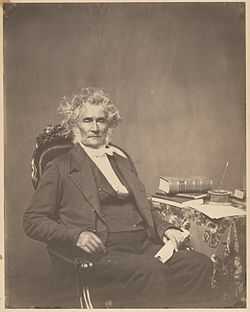Peter Force

Peter Force (November 26, 1790 – January 23, 1868) was a 19th-century American politician, newspaper editor, archivist, and historian.
Born near the Passaic Falls in New Jersey, to William, a soldier in the Revolutionary War and descendant of French Huguenots who arrived on America's shores in the 17th century, and Sarah Force (née Ferguson), Force grew up New Paltz, Ulster County, New York, and afterward moved to New York City, where he was schooled in the printing trade.
History
During the War of 1812, he served in the Army, eventually rising to the rank of lieutenant. Moving to Washington, D.C. three years later, Force returned to the printing business. On August 22, 1822 Force was granted US Patent 3573X for a method of color printing. Force was editor of the National Journal (1823–1841) and would later donate a stone to the Washington Monument. After vigorously supporting John Quincy Adams' election to the United States presidential election of 1824, he served locally as councilman and alderman. He was elected mayor of Washington in 1836 and 1838, but defeated in 1848, all as a member of the Whig Party.
Historian - Published works
His greatest achievement came as a collector and editor of historical documents. He published Tracts and Other Papers, Relating Principally to the Origin, Settlement, and Progress of the Colonies in North America (4 vol Washington, 1836–1846), which comprised rare pamphlets. His American Archives[1] was a collection of the most important documents of the American Revolution, 1774–1776. Twenty large folio volumes were planned but only the first 9 volumes were published between 1837 and 1853. Force's lifelong desire to contribute to the American national library finally came to fruition in 1867 when Congress purchased his collection of original documents for $100,000, augmenting the expansion of the Library of Congress conducted by Ainsworth Rand Spofford, who directed the Library from 1865 to 1897.
Societies
During the 1820s, Force was a member of the prestigious society, Columbian Institute for the Promotion of Arts and Sciences.[2]
Later life
Force died January 23, 1868 at the age of 77. His son, Manning Force, was an officer during the American Civil War.
Burial
Peter Force, alongside his wife, is buried in Rock Creek Cemetery, Force's grave marker was designed by German sculptor Jacques Jouvenal. It is a marble obelisk that stands 16 feet high and rests on top of a square base. A relief is carved into the obelisk of a bookshelf filled with books.
-
_Control_IAS_78250061_(front).jpg)
Front
-
_Control_IAS_78250061.jpg)
Detail
On the front is inscribed:
- Peter Force
- Born
- November 26, 1790
- Died January 23, 1868
- American Archives 1774-1776
On the proper right side is inscribed:
- Hannah
- Wife of Peter Force
- Born April 2, 1798
- Died March 20, 1857[3]
Bibliography
- Peter Force, ed. American Archives 9 vol 1837–1853, major compilation of documents 1774–1776. online edition
- Harlow, Ralph V. "Force, Peter," in Dictionary of American Biography, Volume 3 (1931)
- Sung, Carolyn Hoover. "Peter Force: Washington Printer and Creator of the American Archives." unpublished PhD dissertation George Washington U. 1985. 338 pp. DAI 1986 47(3): 1036-1037-A. DA8529622 Fulltext: in ProQuest Dissertations & Theses
References
- ↑ American Archives Consisting of a collection of authentick records, state papers, debates, and letters and other notices of publick affairs, the whole forming a documentary history of the origin and progress of the North American colonies; VOLS I-V M. St. Clair Clarke and Peter Force, 1837–44., 1837
- ↑ Rathbun, Richard. The Columbian institute for the promotion of arts and sciences: A Washington Society of 1816-1838. Bulletin of the United States National Museum, October 18, 1917. Retrieved 2010-06-20.
- ↑ Michael Richman (c. 1968). "Force Memorial, (sculpture)". Inventories of American Painting and Sculpture. American Art Museum. Retrieved 19 December 2010.
External links
| Wikisource has original works written by or about: Peter Force |
- Peter Force Library
- The Peter Force Collection in the Rare Book and Special Collections Division at the Library of Congress
| Political offices | ||
|---|---|---|
| Preceded by William A. Bradley |
Mayor of Washington, D.C. 1836–1840 |
Succeeded by William Winston Seaton |
|